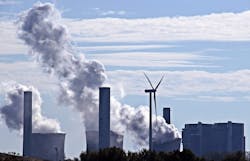Contaminated Groundwater Near Colorado Coal Plant
Groundwater monitoring found elevated levels of several toxic chemicals near coal ash disposal sites at Platte River Power Authority’s Rawhide Energy Station in Wellington, Colo., in 2018, a report shows.
According to the Coloradoan, leaders of Platte River, the electricity provider for Fort Collins, Loveland, Estes Park and Longmont — said improvements to address the contamination were in the works before federally mandated groundwater sampling took place.
They also said the contamination has not affected drinking water or waterways because of Rawhide’s arid environment and lack of nearby groundwater drinking wells or rivers.
“The nice thing about Rawhide is the way it was planned and designed, where it was located, mitigates or even eliminates the kinds of risks that are addressed by this rule across the U.S.,” said Steve Roalstad, Platte River spokesman, according to the Coloradoan.
Power plants dispose of coal ash in specialized landfills and settling ponds, according to the Coloradoan. Platte River produced about 59,500 tons of coal ash and sold 21% of it for reuse in 2018, sending the rest to an on-site landfill and settling pond.
According to the Coloradoan, the Environmental Protection Agency requires plants to take samples at wells "down-gradient" — the groundwater version of "downstream" — of the disposal sites to check for contamination that could migrate to nearby rivers or drinking water sources.
The chemicals that triggered remedial action for Platte River are selenium — found in groundwater near the coal ash landfill — and cobalt, found near a coal ash settling pond that’s being decommissioned. According to the Coloradoan, selenium is toxic to fish and can be toxic to people who eat the affected fish. Cobalt exposure beyond safe levels could contribute to blood disease and thyroid damage, according to the EPA and the Agency for Toxic Substances and Disease Registry.
The selenium and cobalt levels were 33% and 34% higher than groundwater protection standards, according to Platte River. An Environmental Integrity Project report released included Rawhide in its list of 241 coal plants – 91% of those reporting – that found unsafe levels of toxic chemicals in groundwater in 2018.
